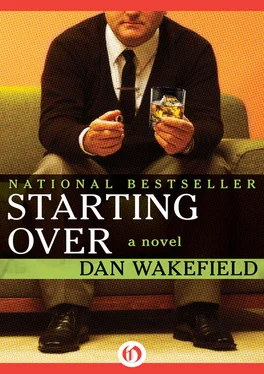“Yes. Other times maybe it lasts a couple months.”
“What about your wife?”
“That was different.”
“How?”
“Well, the only way I can figure it is that we fought so much and broke up so much and started over so much it was like a new thing all the time. Chaos. Constant chaos.”
“So why did it end?”
“I stopped it.”
“Why?”
“I didn’t want to live that way.”
Marilyn lit a cigarette. “Is this way any better?” she asked.
“I’m trying to be honest. Don’t get nasty.”
“I’m sorry.”
“I’m doing the best I can.”
Marilyn sighed. “We all are,” she said.
After a while they both felt a kind of calm relief at having openly admitted their love affair was over. They were too exhausted and too experienced for any more anger or recriminations. They agreed they did not just want to walk out of each other’s life, that they did not want to go back to being alone. They agreed that they needed each other, if only for companionship.
They became friends.
“Allies,” Potter liked to put it, “because it’s like we’re in a war. Not against each other, but against the outside world.”
As Allies, they arrived at certain pacts and understandings for mutual aid and comfort.
If either of them knew of a party, he or she would invite the other. At the party they would be free to look for new prospective lovers, but they couldn’t just go off and leave with a new person. If they met someone they liked, they could make a date or accept a date for a future time and place. At the parties, and to the outside world, they would not discuss the status of their new personal relationship, but let people assume whatever they wanted. Experience had taught them both that it was better to be with a mate in order to catch or attract another mate than to be alone. Alone was undesirable, vulnerable; alone put you in a weakened position.
Either of them could call the other at any time of the day or night, and if they were not otherwise occupied with another person, they would, if so desired, come and keep the other one company. It was a hell of a lot better than phoning up Dial-A-Prayer or the Suicide Prevention Bureau.
They would have dinner together any time they had no other dates or invitations; they would alternate between Marilyn cooking at home and Potter taking them out to a restaurant.
Marilyn suggested that after a while, if they both felt like it, they might even have a friendly fuck from time to time.
“Entirely possible,” Potter agreed.
They had formed their alliance just in time to be of aid to one another during the most prolonged and dangerous siege of all single people’s personal war to survive. The jingly, tinselled specter of it hung just a few days ahead of them, the annual psychic bombardment that every lonely person most feared and dreaded, from the first sign of turkey sales on through the incessant clanging of carols to the last bleary notes of Guy Lombardo playing “Auld Lang Syne”; the trinity of public trials called Thanksgiving, Christmas, and New Year’s, that annual punishing gauntlet known gaily as— The Holidays .
Thanksgiving. Silver-bright, and silent. All good citizens were gathered ’round the hearth, ready for the great symbolic bird, trussed and stuffed, to be laid legs up on the family table and ringed with bowls of candied yams, cranberry sauce, thick brown gravy, carrots-n-peas, steaming squash, hot gold rolls, bricks of butter, all of it. The nation was prepared for feasting—or pretending to be.
Lone men and women—those who were not taken in like charity cases by benevolent families—huddled out of sight in their own apartments, curtains drawn, TVs tuned to anything that moved and made noise. Stealthily they sloshed rye or bourbon or Scotch into tall glasses, punctured cans of butterscotch Metrecal for the quickest necessary nourishment, or slipped frozen Mexican TV dinners into ovens for half-hearted soggy sustenance. All stores were locked and dimmed, and those loners who had not made previous arrangements for provisions of at least some simple snack that would get them through the day were doomed now to run this holiday’s gauntlet with whatever might be found in their cupboards—a long-forgotten tin of sardines, a can of Chef Boy-ar-dee Spanish rice, an abandoned box of stale Cheez-its; or perhaps, rooting in refrigerators, they might seize as gratefully as rats on some spoiled hunk of liederkranz, the carcass of a barbecued chicken not thrown away because of a few edible glimmers of white meat remaining to be gnawed, and for a side order, the limp savings of an oversoaked salad left from a week before. Such scraps now appeared as treasures, as royal fare to starving stomachs, for they could, taken together, provide enough sustenance to keep the lone prisoners of social scorn alive in their isolated cells until the next blessedly non-holyday allowed them to mingle anonymously with the rest of the world, as if they were a rightful part of it.
But if there were not enough scraps to sustain them inside their own private lair, if their bellies pushed them beyond pride, if their ill-tended systems trembled toward an absolute need for food at any emotional cost, they had no choice but to walk the plank of the empty sidewalks (past the warm lighted windows where the righteous were stuffing themselves with stuffing) to the most degrading and torturous punishment society saved for those who lived alone. Heads bowed in shame and the hope of avoiding recognition, they had to enter one of those plateglass (the better for others to watch them squirm), strobe-lit dungeons of the human heart, whose windows displayed, with a wicked pretense of jollity, cut-rate imitations of the Great Feast: “Special! Turkey Dinner With All The Trimmins! $1.85.”
The victims carried their plastic trays laden with plastic imitations of food that mocked the real feast—gristly gravy over watered potatoes and razor cuts of some failure of a fowl that seemed to be bleeding the congealed blood of cranberry. They carried it alone to a lone table to bolt it down, hoping no one would know they were reduced to this un-holyday indignity. Their eyes were kept glued on the gluey grub before them. There wasn’t even a newspaper for distraction because papers didn’t appear on holidays, leaving the paper-less loner to suspect that all printers and reporters and editors and vendors were safe and happy in their glow of a home, kindled by the warmth of their kin, while only the outcasts, the derelicts, the failed family-less futile loners were condemned to such places on days like this. No wonder there were so many suicides on holidays. Better, they figured, to stick your own head in the oven for roasting than to sit before the world an acknowledged nonentity eating your holiday meal with all the trimmings in the lit fishbowl of social infamy, displayed like a punished pilgrim in the public stocks.
Potter and Marilyn had been spared the more medieval tortures of the occasion by an invitation to spend Thanksgiving at the Bertelsens’. Marva called Potter to invite him, and she added, “Marilyn, too—that is, if you two are still an item.”
“Who said we weren’t?” Potter snapped.
“Why—no one, Phil. No one at all. It’s just that I haven’t heard from either of you in a while, and I didn’t know—how things were.”
“Well, things are just fine.”
“Gee, I didn’t mean to upset you.”
“You didn’t upset me. I’m not upset in the least.”
He tried to lower his voice, steady it, not give away any more than he already had. Marva’s sixth sense for sniffing out other people’s personal problems had somehow picked up the scent of some change in his relationship with Marilyn, and he had no doubt helped confirm her suspicions by his irritable reaction.
Читать дальше












